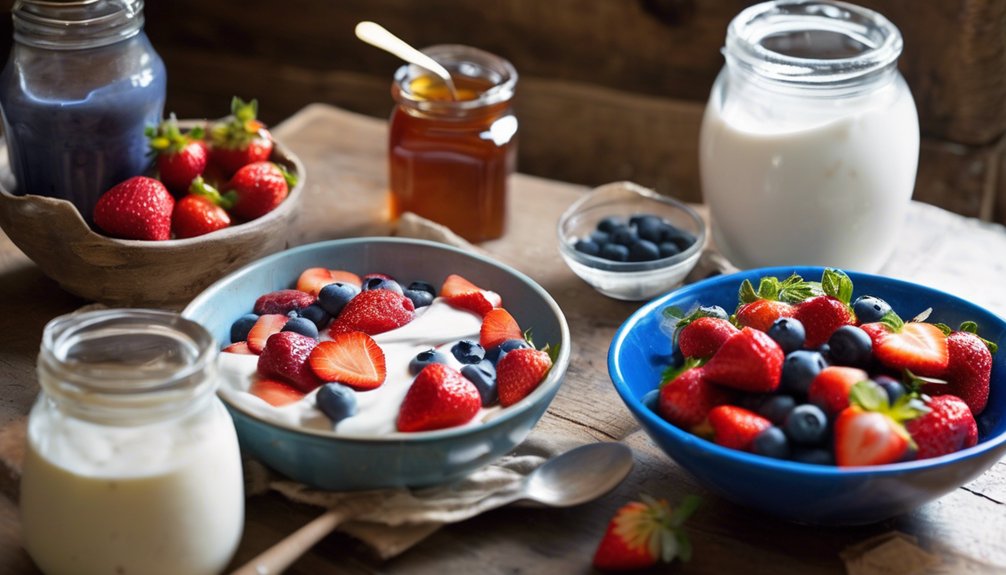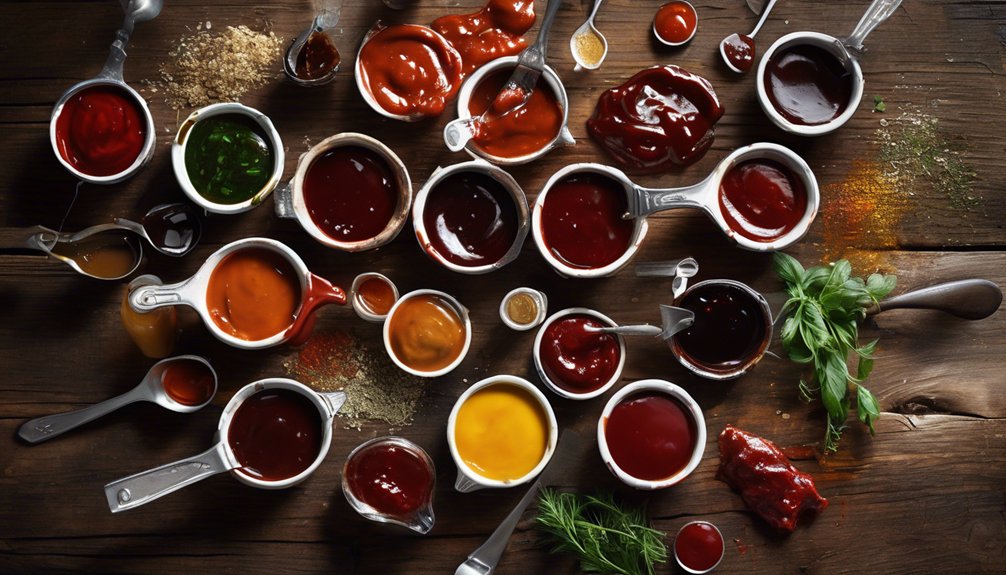Avoid These Hidden Sugars Daily
You might not realize just how many hidden sugars lurk in your daily diet. Everyday items like flavored yogurts and sauces often contain more sugar than you'd expect, which can lead to unwanted health issues. Understanding where these sugars hide is crucial for maintaining a balanced diet. Let's explore some common foods that might be sabotaging your health goals and learn how to make smarter choices.
Key Takeaways
- Always read food labels to identify hidden sugars, especially in sauces, yogurts, and packaged snacks.
- Choose whole fruits over fruit juices to avoid excessive sugar intake.
- Opt for plain yogurt and add fresh fruits or nuts for a healthier option.
- Be cautious with granola bars, as they can contain more sugar than candy bars.
- Limit consumption of popular condiments like ketchup and BBQ sauce, which often contain high-fructose corn syrup.
Understanding Hidden Sugars
Have you ever wondered how much sugar is really in your favorite foods? Hidden sugars lurk in many products, affecting your sugar metabolism in ways you mightn't realize.
When you consume these sugars, your body processes them quickly, leading to spikes in blood sugar levels. This can result in fatigue and cravings, creating a cycle that's hard to break.
The health implications are significant; excessive sugar intake can contribute to obesity, diabetes, and heart disease.
It's not just about sweet treats—condiments, sauces, and even bread can pack a sugary punch. By being aware of hidden sugars, you can make informed choices that support your health and well-being.
Your body deserves the best, and understanding hidden sugars is a vital step.
Common Foods With Hidden Sugars
Many everyday foods contain hidden sugars that can catch you off guard. For instance, fruit juices might seem like a healthy option, but they often pack as much sugar as soda. Even 100% fruit juice can spike your blood sugar levels.
When it comes to yogurt choices, many flavored varieties are loaded with added sugars, making them less nutritious than you'd expect. Opt for plain yogurt and add your own fresh fruit for a healthier snack.
Read labels carefully, as terms like "agave nectar" or "high fructose corn syrup" can indicate hidden sugars. Being mindful of these common foods helps you make better choices and maintain a balanced diet, so you can feel your best every day.
Sauces and Condiments to Watch Out For
While you might think a drizzle of your favorite sauce or condiment adds flavor without extra calories, you could be surprised by the hidden sugars lurking in those bottles.
Many popular sauces, like ketchup or barbecue sauce, often contain high-fructose corn syrup or other sugary sauce ingredients. When you're reaching for that bottle, take a moment to check the condiment labels.
You might find that what seems like a harmless addition can quickly turn into a significant sugar intake. Opt for brands with fewer ingredients or those that use natural sweeteners.
Being mindful of what you're pouring can help you enjoy your meals without the unwanted sugar spike. Your health will thank you for it!
The Sneaky Sugars in Snacks
Even if you're mindful of sauces and condiments, snacks can also be a sneaky source of hidden sugars.
To help you navigate your snack choices, keep an eye out for these common culprits:
- Granola Bars: Often marketed as healthy, they can pack more sugar than candy bars.
- Flavored Yogurts: Many contain added sugars that mask the natural flavor of yogurt.
- Ketchup and BBQ Chips: These snacks often have high sugar content to enhance flavor.
- Trail Mix: Pre-packaged varieties might include sugary dried fruits and chocolate.
Consider opting for snack alternatives like air-popped popcorn or veggies with hummus.
You can also explore sugar substitutes to satisfy your sweet tooth without the extra calories.
Stay vigilant!
Breakfast Foods That May Surprise You
When you think about breakfast, you might picture classic options like eggs or oatmeal; however, some popular breakfast foods can surprise you with their hidden sugar content.
Many oatmeal options, especially flavored varieties, can contain added sugars that quickly elevate your intake. Even seemingly healthy yogurt varieties often pack in surprising amounts of sugar, particularly those marketed as "fruit-flavored" or "low-fat."
It's essential to read labels carefully, as some brands may include sweeteners that you wouldn't expect. For a healthier breakfast, consider plain oatmeal topped with fresh fruit or unsweetened yogurt with nuts.
Desserts and Their Deceptive Labels
Breakfast choices aren't the only foods that can hide unexpected sugars; desserts often come with deceptive labels that mislead consumers about their true sugar content.
You might think you're indulging in guilt-free desserts, but those labels can be tricky. Here are four things to watch for:
- Sugar Substitutes: These can still affect your blood sugar levels.
- Natural Sweeteners: Honey and agave may seem healthy, but they can pack a sugar punch.
- Serving Sizes: Smaller portions might hide higher sugar levels per serving.
- "Low-Sugar" Claims: These can mask added sugars elsewhere in the ingredient list.
Always read the labels carefully and be mindful of hidden sugars in your favorite treats. Your body will thank you!
Be Cautious With Beverages
While you might think a refreshing beverage is a harmless choice, many drinks are laden with hidden sugars that can quickly derail your healthy eating habits.
From sodas to flavored teas, these sugary beverages can pack more sugar than you realize. When making your beverage choices, be mindful of those sneaky added sugars that contribute to excess calories and health risks.
Instead, consider opting for sugar alternatives like stevia or monk fruit to satisfy your sweet tooth without the guilt. Herbal teas and sparkling water infused with fruit can also offer a delightful and healthier option.
Reading Labels: What to Look For
Understanding what's in your food and drinks is vital, especially when it comes to hidden sugars.
Label reading is essential for ingredient awareness, so keep an eye out for these common culprits:
- High Fructose Corn Syrup – Often sneaks into processed foods.
- Sucrose – Regular table sugar can be disguised in many forms.
- Agave Nectar – Marketed as natural, but it's still sugar.
- Fruit Juice Concentrate – It sounds healthy, but it packs a sugary punch.
Tips for Reducing Sugar Intake
Reducing your sugar intake can be easier than you think, especially when you adopt a few simple strategies. Start with meal planning—by prepping your meals ahead of time, you'll have better control over what you eat and can choose lower-sugar options.
Focus on whole foods like fruits, vegetables, lean proteins, and whole grains, which naturally contain less sugar.
Incorporate mindful eating into your routine. Take time to savor each bite, which helps you appreciate your food and recognize when you're full. This practice can deter unnecessary snacking on sugary treats.
Lastly, swap sugary beverages for water or herbal teas. By making these small adjustments, you'll not only reduce sugar intake but also promote a healthier lifestyle overall.
Frequently Asked Questions
How Can I Identify Hidden Sugars in Homemade Foods?
You can identify hidden sugars in homemade foods by practicing ingredient awareness. Check labels carefully and use labeling techniques like reading ingredient lists. Look for common sugar aliases to ensure you're making informed choices.
Are All Natural Sweeteners Considered Hidden Sugars?
Not all natural sweeteners are hidden sugars, but some can act like sugar alternatives. You'll want to read labels closely, as even "natural" options can spike your blood sugar or hide in unexpected places.
Do Hidden Sugars Affect Weight Loss Efforts?
Hidden sugars can sabotage your weight loss efforts by increasing your caloric intake without you realizing it. Staying mindful of these sugars helps you manage your weight more effectively, supporting your goals for a healthier lifestyle.
Can Hidden Sugars Contribute to Chronic Health Issues?
Yes, hidden sugars can contribute to chronic diseases. They disrupt sugar metabolism, leading to insulin resistance and increased inflammation. By being mindful of sugar intake, you can support your long-term health and reduce these risks.
What Are the Long-Term Effects of Consuming Hidden Sugars?
Consuming hidden sugars can lead to serious long-term effects like metabolic syndrome and poor dental health. You may experience weight gain, increased blood sugar levels, and cavities, impacting your overall well-being and quality of life.
Conclusion
In your quest for a healthier lifestyle, don't let hidden sugars sneak into your diet like a thief in the night. By staying vigilant and informed, you can dodge these sugary traps that lead to health complications. Remember, even the most appealing snacks and sauces can mask their true intentions. So, embrace the wisdom of checking labels and opting for natural choices. With a conscious effort, you'll pave your way towards better health, much like Odysseus navigating past the Sirens.












